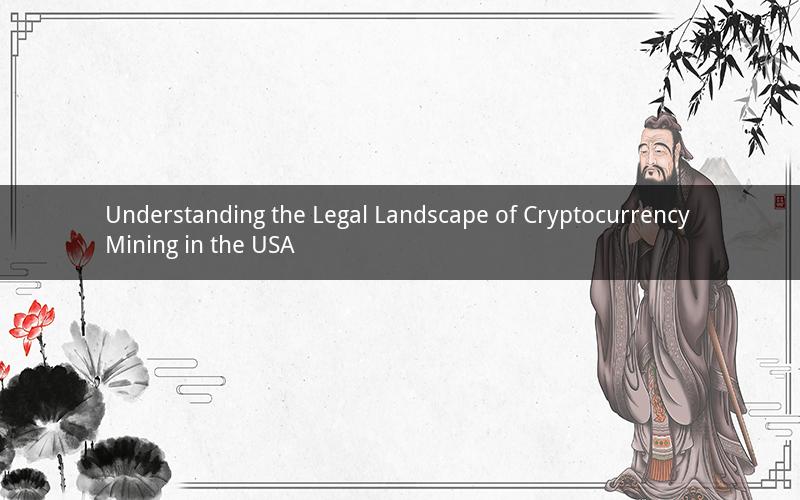
Introduction:
Cryptocurrency mining has gained immense popularity over the years, with many individuals and businesses engaging in this activity. However, the legality of cryptocurrency mining varies from country to country. In this article, we will delve into the legal landscape of cryptocurrency mining in the USA, exploring the regulations and laws that govern this practice.
1. Overview of Cryptocurrency Mining:
Cryptocurrency mining involves the process of validating and adding new transactions to a blockchain network. Miners use powerful computers to solve complex mathematical problems, and in return, they receive cryptocurrency rewards. The process requires significant computational power, electricity, and hardware investment.
2. Legal Status of Cryptocurrency Mining in the USA:
The legality of cryptocurrency mining in the USA is a complex issue, as it depends on various factors, including federal, state, and local laws. Here's a breakdown of the legal status:
a. Federal Level:
At the federal level, cryptocurrency mining is not explicitly illegal. The USA does not have a specific law that prohibits or regulates cryptocurrency mining. However, miners must comply with certain regulations, such as tax laws and anti-money laundering (AML) requirements.
b. State Level:
The legality of cryptocurrency mining varies from state to state. Some states have specific regulations or restrictions on mining activities, while others have no specific laws regarding it. It is crucial for miners to research and understand the laws of their respective states to ensure compliance.
c. Local Level:
Local governments may also have their own regulations regarding cryptocurrency mining. Some cities or towns may impose restrictions on mining activities due to concerns about electricity consumption, noise, or environmental impact. Miners should consult local authorities to understand any specific requirements or restrictions.
3. Tax Implications:
One of the critical aspects of cryptocurrency mining in the USA is the tax implications. Miners must report their cryptocurrency earnings as income and pay taxes accordingly. The IRS considers cryptocurrency mining as self-employment income, and miners are required to pay self-employment taxes.
4. Energy Consumption and Environmental Concerns:
Cryptocurrency mining is a highly energy-intensive process, leading to concerns about its environmental impact. Some states and local governments have implemented regulations to address these concerns. Miners may need to obtain permits or comply with specific energy consumption requirements to operate legally.
5. Legal Challenges and Cases:
There have been several legal challenges and cases related to cryptocurrency mining in the USA. Some miners have faced legal issues regarding electricity theft, environmental violations, or failure to comply with local regulations. These cases highlight the importance of understanding and adhering to applicable laws.
Frequently Asked Questions:
1. Q: Can I mine cryptocurrency in the USA without facing legal consequences?
A: Yes, you can mine cryptocurrency in the USA, but it is crucial to comply with federal, state, and local laws. Ensure you understand the regulations in your jurisdiction and obtain any necessary permits or licenses.
2. Q: Do I need to pay taxes on my cryptocurrency mining earnings?
A: Yes, you must report your cryptocurrency mining earnings as income and pay taxes accordingly. The IRS considers cryptocurrency mining as self-employment income, and you may be required to pay self-employment taxes.
3. Q: Can I mine cryptocurrency in any state in the USA?
A: While most states allow cryptocurrency mining, some have specific regulations or restrictions. It is essential to research and understand the laws of your state to ensure compliance.
4. Q: Are there any environmental concerns associated with cryptocurrency mining?
A: Yes, cryptocurrency mining is highly energy-intensive and can have a significant environmental impact. Some states and local governments have implemented regulations to address these concerns, such as imposing energy consumption requirements or requiring permits.
5. Q: Can I mine cryptocurrency in a rented property?
A: It depends on the lease agreement and the property owner's permission. Before mining cryptocurrency in a rented property, ensure you have obtained the necessary consent and comply with any restrictions or requirements mentioned in the lease agreement.
Conclusion:
Understanding the legal landscape of cryptocurrency mining in the USA is crucial for individuals and businesses engaging in this activity. While cryptocurrency mining is not explicitly illegal at the federal level, miners must comply with federal, state, and local laws. It is essential to research and understand the regulations in your jurisdiction, pay taxes on earnings, and address any environmental concerns. By doing so, you can operate legally and avoid potential legal issues.